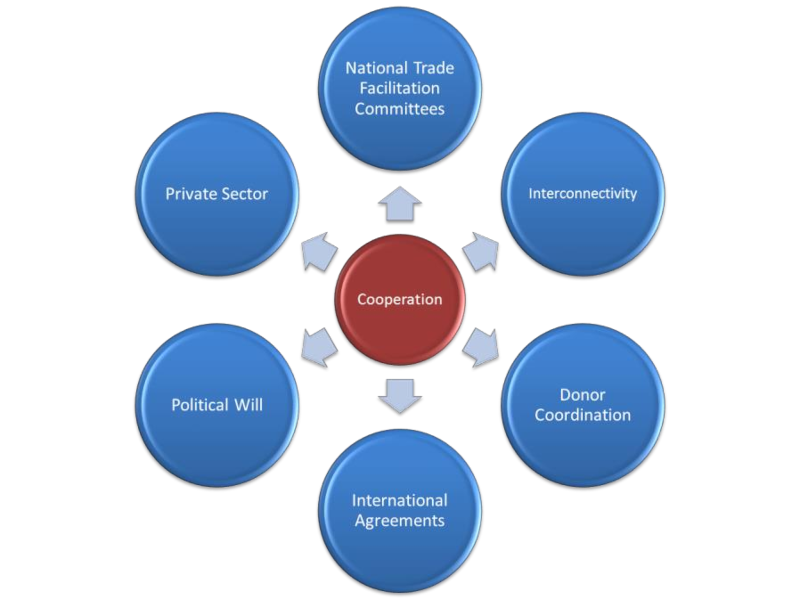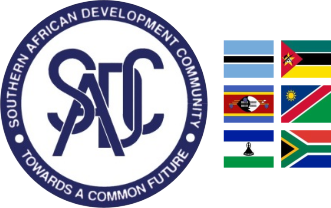The purpose of this cluster is to ensure that customs and other government agencies develop cooperative relationships with stakeholders, including the private sector, and other customs administrations and government agencies. The figure below summarises activity areas.

Establish Multi-Agency National and Regional Trade Facilitation Committees
The SADC Regional Strategic Development Plan (RISDP) called for customs and the private sector to cooperate and the Revised RISDP adopted in April 2015 continues this theme of stakeholder cooperation. At the regional level, there has been progress in establishing a cooperation mechanism and Member States have established partnerships through national Customs-to-Business forums.
Article 23 of the WTO TFA requires Members to establish national committees on trade facilitation to coordinate domestic implementation of TFA provisions. Article 23 does not elaborate on committee composition and function. UNCTAD, however, has a list of agencies and organizations typically involved in cross-border trade, and suggest that agency representatives to the national committee come from different functional levels, including executive and non-executive directors and technical staff. Moreover, the committee would be characterized by transparent collaboration among representatives of the following public and private sector entities:
- Implementing agencies: customs, quarantine, standards board, port authority, and airport authority, etc.
- Attorney General or Legal Department of Cabinet (with regard to relevant legal matters, such as appeals)
- Line ministries for transport, commerce, foreign affairs, economy, and finance Ministries for agriculture and animals, food and drugs, and environment
- A representative cross-section of private sector interests, including large and small importers and exporters, carriers, freight forwarders, customs brokers, cargo owners, chambers of commerce, and shippers’ associations
SADC has a role to play in monitoring and supporting the development of national multi-agency trade facilitation committees. SADC [Secretariat] should support Member States by providing technical assistance that supports trade facilitation endeavors emanating from national committees. The current SADC Sub-Committee on Trade Facilitation (SCTF) established under Article 6 of Annex III of the Protocol on Trade and the Sub-Committee on Customs Cooperation (SCCC) should provide the leadership and guidance necessary to do the following:
- Address cross-border issues raised at the national level;
- Implement procedural and other improvements required by the WTO TFA; and
- Cultivate specific interventions associated with WTO TFA measures that have regional connotations and that could be supported at the national level through regional implementation.
Interconnectivity
Information and Communications Technology (ICT) is used widely in the SADC region and the vast majority of customs goods clearance is processed electronically. ICT, however, tends to be reliable only in the main centers and not at all border posts. Interconnectivity among various customs information systems is necessary for efficient and effective accounting for goods and revenue, simple and efficient goods declaration, reliable trade data, and improved risk management and customs enforcement.
Individual Member States use different computer systems. Eight use ASYCUDA, one uses TIMS, one uses CMS, and one uses CAPE. This has prevented the systems from being compatible and linked.
Interconnectivity of various border clearance systems plays a key role in trade facilitation. It is through adoption and implementation of ICT in Customs and other border agency procedures to meet many objectives that the end goal; which is to increase efficiency of transference of goods to the end users; can be achieved. Interconnectivity needs to adopt and develop systems, processes and procedures to ease the border clearance work based on standard networking modalities.
There is therefore a need to develop a clear roadmap for interconnectivity in the SADC region. This effort needs to continue as establishing interconnectivity will be crucial to regional data exchange and will be required for any electronic single window applications.
Donor Coordination
Accountability between donors and recipients enables partnership and a focus on results. Three things are needed to establish mutual accountability:
- A shared agenda with clear objectives and reciprocal commitments;
- Monitoring and evaluating these commitments and actions; and
- Dialogue and review.
A perennial challenge in capacity building is lack of coordination and communication among donors and duplication of effort and/or errors of omission. To achieve real improvement, developing country governments must avoid the temptation of accepting donor assistance simply because it is available. Officials should be more active and positive in identifying genuine needs and in shaping the strategy and tactics for meeting those needs.
In addition to available resources such as the SADC/EU Trade Related Facility (TRF) and Regional Economic Integration Support Programme (REIS), the Member States should consider tapping into funding mechanisms focused on trade facilitation, such as:
- AfDB’s African Trade Fund
- UNCTAD’s Multi-Donor Trade Facilitation Trust Fund
- USAID’s Partnership for Trade Facilitation
- World Bank’s Trade Facilitation Support Programme
- WCO’s Mercator Programme
- WTO’s TFA Facility
To ensure coordination and communication prevails, SADC Secretariat should continue to monitor capacity building assistance in Member States through its thematic donor coordination meetings. SADC [Secretariat] should monitor the need for donor assistance at the Member State level without becoming directly involved and ensure donors are aware of similar needs and requests in the region.
This coordination should include the following:
- A matrix of donor intervention and plans
- A summary gap analysis of outside support for the TFP and other regional and national initiatives
- Identification of TFP areas that need external support
- Establishment of a donor coordination mechanism.
SADC [Secretariat] could also coordinate technical assistance from regional resources to support Member States. Coordination will become increasingly important as the need for technical assistance rises with the implementation of the WTO TFA.
Bilateral and Multilateral Agreements and Trade Facilitation projects
Part Eight of the SADC Protocol on Trade (Articles 27, 28, and 29) covers trade relations among Member States and with third countries. The three articles outline obligations regarding preferential trade arrangements, most favored nation treatment, and trade policy coordination. Member States may maintain preferential trade and other trade arrangements and enter into new arrangements between themselves and with third countries provided the arrangements do not impede the objectives of the protocol. SADC must ensure that a mechanism is in place to review and monitor arrangements among Member States and with third countries.
Foster and Broaden Political Will
Government officials, whether at the ministry, agency, regional, or field level, must recognize that they are responsible for improving trade processes. An awareness of the long-term economic impact of trade facilitation should engage the interest of government whose support is so crucial.
National and regional trade facilitation committees, if properly constituted, motivated, and empowered, would provide the leadership necessary to bring agencies and stakeholders together in a concerted effort to make the procedural and other improvements required by the WTO TFA, RKC, and the various SADC initiatives, including the TFP. Note that the political will to sustain committees and SADC initiatives must emanate from the highest possible authority in the government. In terms of the TFP, communication will be key to ensuring the commitment of governmental and private entities.
The Customs Unit within TIFI Directorate (or other business unit) should spearhead a structured communications activity to ensure that SADC directorates, committees, and subcommittees and Member State ministries, departments, agencies, and private sector trade associations are briefed regularly on the TFP plans, activities and status.
Public/Private Sector Cooperation
The relationship between customs and the private sector in the SADC region is maturing. Both sides grasp the need to collaborate to ensure the region is pro-business. At a regional level, work has progressed on a cooperation mechanism focused on action and practical benefits but there remains a need for capacity building within the private sector in terms of trade and customs matters.
The Revised RISDP calls for the institutionalization of public and private sector dialogue and even for the adequate representation of the private sector at all relevant decision-making levels in SADC. The Sub-Committee on Customs Cooperation (SCCC) emphasized the importance of strengthening cooperation between customs and the private sector and recommended the establishment of National Customs Business Forums (NCBF) in all SADC Member states. Partnership has cascaded to the national level through the Customs-to-Business forum concept.
For implementation of the TFP, there is need for effective structures to engage SCCC and governments with the private sector.
SADC has an opportunity to introduce a coordinated border management approach with other border agencies through the concept of Customs-to-Business forums at the cross-border and local port/station levels as well as the Member State level. There is a long held desire to improve dialogue between the SCCC and the private sector. This could be achieved by establishing a Regional Customs-to-Business forum.


